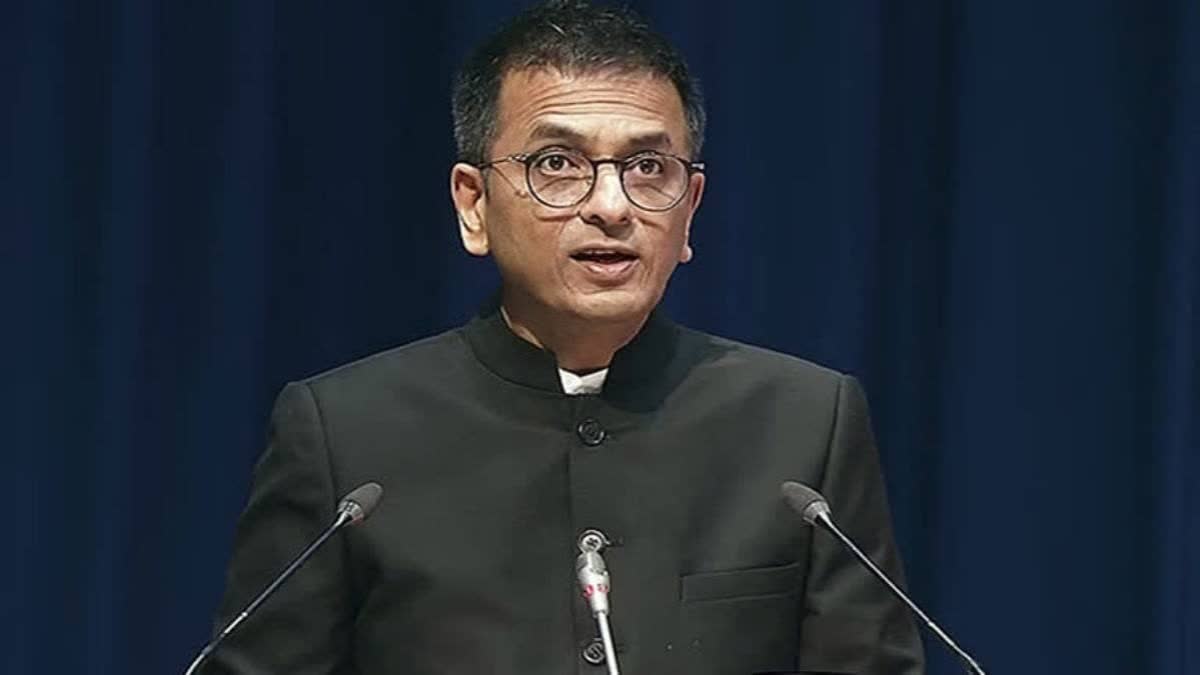New Delhi:Chief Justice of India DY Chandrachud on Saturday said it is essential to ensure that the justice system, from police stations to the courtrooms, understands and responds to the compounded vulnerabilities of children with disabilities.
He stressed that it must be ensured that the country's legal, social, and institutional systems are designed to accommodate, actively protect, and empower these children.
The CJI, who fosters two young daughters with special needs, said: “This year's theme holds a special place in my heart: the protection and well-being of children with disabilities. As someone who fosters two wonderful young daughters, I am reminded daily of the joy, purpose, and love they bring into my life.”.
“They have transformed not only how I see the world but also how I engage with it—sstrengthening my commitment to creating a more inclusive society where every child, regardless of their abilities, is cherished and protected," he said.
The CJI said the challenges faced by persons with disabilities extend far beyond issues of physical accessibility, and they must also contend with entrenched societal biases, stereotypes, and misconceptions that permeate nearly every facet of life.
Speaking at the ninth National Annual Stakeholders Consultation on Child Protection, he said we must prioritise improving data collection systems within the juvenile justice framework.
“Data is the foundation for meaningful reforms, enabling policymakers to develop tailored interventions, measure their impact, and adapt strategies accordingly. Without it, children with disabilities will continue to fall through the cracks, unseen and underserved," he said.
The CJI said the Juvenile Justice (Care and Protection of Children) Act defines a child in need of care and protection as one who is mentally ill, mentally or physically challenged, or suffering from a terminal or incurable disease. He said it also states that anyone who commits an offence against a disabled child is liable to twice the penalty.
“However, this punitive approach may not address the root causes of abuse or neglect, nor provide adequate support or rehabilitation for the child involved in conflict with the law," said CJI Chandrachud.
"We must ensure that the justice system, from the police stations to the courtrooms, understands and responds to the compounded vulnerabilities of these children. The incorporation of restorative justice approaches is one such solution," he said.
According to him, the JJ Act outlines various rehabilitation and reintegration measures for children in conflict with the law, such as counselling, education, vocational training, and community service. “For children with disabilities, these measures can be adapted to ensure they receive the specialised support they need to thrive."
The CJI said when we talk about juvenile justice, especially in the context of children with disabilities, we cannot ignore the concept of intersectionality, and the doctrine of intersectionality highlights how multiple identities intersect to create unique experiences of discrimination.
“Disability often intersects with other marginalised identities such as gender, caste, socio-economic status, and ethnicity, amplifying the discrimination children face," he said.
"We must ensure that our legal, social, and institutional systems are designed not just to accommodate, but to actively protect and empower these children," said the CJI.
He stressed that disability often intersects with other marginalised identities such as gender, caste, socio-economic status, and ethnicity, amplifying the discrimination children face and adding that for children with disabilities, these compounded vulnerabilities can have devastating effects.
The CJI asked, "Are we equipped to handle the needs of children with disabilities in the justice system? Renowned psychologist Reuven Feuerstein posits that three prerequisites must be met for an inclusive environment in the context of inclusive education: preparation of receiving institutions, preparation of the individual child, and preparation of parents."
“We need to extend this framework to the juvenile justice system—have we prepared our justice institutions? Are the judges, police officers, and lawyers equipped to understand the unique challenges faced by children with disabilities? Sadly, the answer is often no," he said.
The CJI said professionals within the justice system require ongoing training and sensitisation to comprehend the nuanced vulnerabilities of these children. He said sensitisation would not only reduce the re-victimisation of children in legal proceedings but also promote more compassionate handling of cases.
The CJI said the lack of implementation mechanisms may render many legal protections ineffective in practice. “The need to strengthen the frameworks is clear. For example, procedural accommodations such as interpreters, modified questioning, and the presence of intermediaries are often not provided, leaving children with disabilities at a disadvantage within the judicial system," he said.
The CJI cited the example of New Zealand, which has implemented robust measures, including specialist advocates for children with disabilities and customised courtroom settings to accommodate their needs.
The two-day program was organised under the aegis of the Juvenile Justice Committee of the Supreme Court in association with UNICEF, India.
Union Minister for Women and Child Development Annpurna Devi gave the special address for the two-day program, while the opening remarks were given by Justice BV Nagarathna, who is also the chairperson of the Juvenile Justice Committee of the Supreme Court. Country representative of UNICEF, India Cynthia McCaffrey, gave the introductory address on the topic.
Justice Nagarathna, in her address, said children and persons with disabilities struggle because of the intersection of a vulnerability with a barrier, and if barriers are removed, children become part of society with equal access to opportunities.
Thus, policies should focus on removing these, such as (i) inaccessible social services and systems, (ii) lack of access to assistive technology, (iii) lack of accessible communication formats, and (iv) limited support for their parents or carers," she said.
She stressed that removing barriers entails ensuring that our schemes and services are inclusive and that they factor in reasonable accommodation.
Read More
- Few More Judges To Be Appointed In Bombay HC Soon, Says CJI Chandrachud
- CJI Chandrachud Launches Online Mediation Training Web Portal
